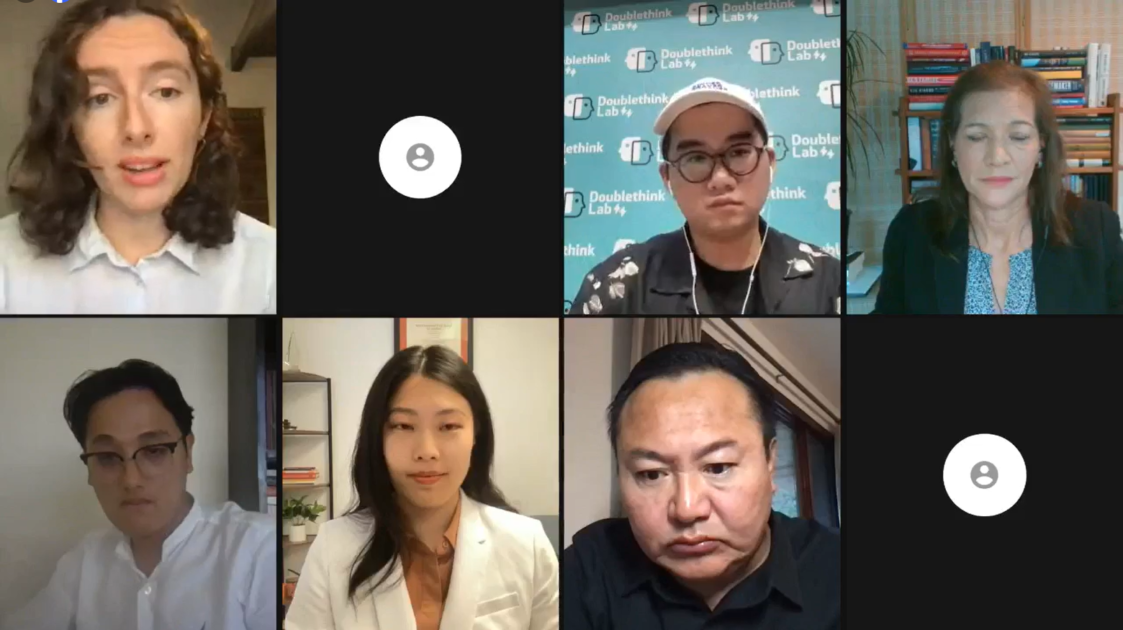Webinar calls China out on its Transnational Repression campaign
On 11 October, seven advocacy groups representing Hong Kongers, Taiwanese, Han Chinese, Falun Gong practitioners, Uyghurs, Southern Mongolians and Tibetans spoke against China’s transnational repression campaign in a webinar organised by the Tibetan Centre for Human Rights and Democracy (TCHRD).
Ms Joey Siu, a pro-democracy activist from Hong Kong, outlined the cautious measures taken by activists due to fear of reprisals against their families and relatives. She emphasised China’s use of both state-affiliated and non-state-affiliated actors in suppressing dissent.
Mr. Eric Hsu from DoubleThink lab highlighted the various forms of transnational repression, such as cyber-attacks and cross-border arrests, the collective objective being to stifle dissent and destabilise the work of activists and human rights organisations. He advocated for international civil society collaboration to combat transnational repression.
Ms Louisa Greve from the Uyghur Human Rights Project detailed instances of Chinese pressure on the Uyghur asylum seekers in Europe including relentless harassment and intimidation such as threatening phone calls from Chinese police officers, and the resultant psychological toll on those targeted. She emphasised policy responses, urging democratic governments to safeguard their citizens’ rights.
Ms. Ramona Li from the Network of Chinese Human Rights Defenders focused on the impact of transnational repression on overseas Chinese activists, and the challenges and increased sensitivity regarding rights violations reporting in China. She pointed out the tightening crackdown on dissenting voices and the increased surveillance by Chinese authorities on social media platforms.
Enghebatu Togochog, director of the Southern Mongolian Human Rights Information Center, detailed the historical and contemporary pressures faced by Southern Mongolians, including deportations and extradition instigated by China.
Cynthia Sun from Falun Dafa Information Center outlined cases of transnational repression, citing incidents of bribery and physical assaults on Falun Gong practitioners, illustrating Beijing’s broad campaign to eradicate Falun Gong.
Mr. Ngawang Lungtok, researcher at TCHRD, summarised the extensive and concerning nature of China’s transnational repression campaign targeted at a wide range of individuals seen as threats to the Chinese Communist Party. Shedding light on various aggressive tactics employed by the CCP, from renditions and assaults to digital surveillance and plain blackmailing, he drew attention to TCHRD’s two upcoming reports on transnational repression and the situation of Tibetan refugees in Nepal.
As an NGO side event at the 54th UN Human Rights Council session, the webinar titled “Exporting Authoritarianism: China’s Transnational Repression Campaign” was moderated by TCHRD’s research assistant Ms Ottoline Mary. In her opening remarks, Ms Mary delineated China’s engagement in this reprehensible practice, underscoring the escalating significance and immediacy of transnational repression. She briefly touched upon the preliminary findings of TCHRD’s forthcoming report on transnational repression.
The session ended with the speakers fielding questions from the online audience.

Speakers from seven advocacy groups representing Hong Kongers, Taiwanese, Han Chinese, Falun Gong practitioners, Uyghurs, Southern Mongolians and Tibetans spoke on China’s transnational repression campaign in a webinar organised by the Tibetan Centre for Human Rights and Democracy (TCHRD).

